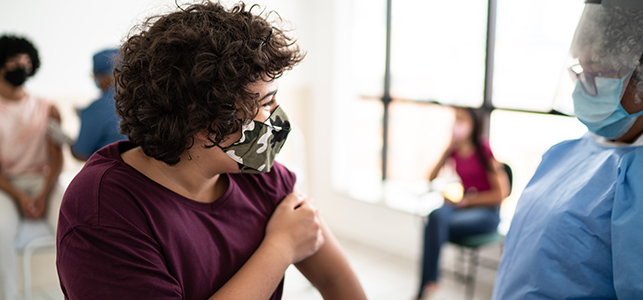
Originally posted December 14, 2020
Updated May 13, 2021
Your 12-year-old is eligible for the COVID vaccine! Here's what our epidemiologist wants you to know.
The U.S. Food and Drug Administration has granted an Emergency Use Authorization allowing adolescents ages 12-15 to get the COVID vaccine – another giant leap forward in the fight against this coronavirus.
“We’re elated to be able to protect more of our patients from COVID-19 through vaccination. We understand that parents may have questions before signing their kids up for the vaccine and we’re always happy to answer those questions and arm families with the information they need to feel comfortable. The biggest things I want parents to know are that this vaccine is safe, effective and our best shot at beating COVID-19,” said Dr. Emily Godbout, epidemiologist and infectious diseases specialist.
Dr. Godbout answers some of the most common questions parents have about the COVID-19 vaccine for adolescents.
Which vaccine is available for kids ages 12+?
The FDA's most recent EUA is specifically for the Pfizer-BioNTech COVID-19 vaccine for children 12-15 years old. This is currently the only COVID-19 vaccine authorized for people under 18.
How do we know it's safe?
Before the FDA grants an EUA, vaccines go through a rigorous series of trials. Children’s immune systems are different from adults and they can even vary at different ages. Vaccines are fully tested on specific age groups for their unique stages of development. EUAs are granted for age groups only once the vaccines have proved to be safe and effective. Multiple federal partners are working together to ensure that the COVID-19 vaccines are as safe as possible.
The COVID-19 vaccines were developed rapidly not because corners were cut, but because they were a top priority and, thankfully, research on a COVID-19 vaccine didn’t have to start from scratch. Scientists have significant prior experience working with other coronaviruses such as SARS and MERS.
Adolescents typically don't develop severe COVID-19 symptoms. Why do they need to be vaccinated?
Generally, adolescents who contract COVID-19 usually don’t develop severe symptoms, but they have in rare cases. Adolescents can also contribute to the spread of COVID-19. Vaccinating adolescents and everyone who is eligible is critical in helping to stop the spread of COVID-19 and keep everyone healthy. The vaccine will also help make life a little more normal and prevent adolescents and teens from missing school, sporting events and other activities if they are exposed to someone with COVID-19.
Is the vaccine as effective in adolescents as it is in adults?
The Pfizer-BioNTech clinical trial was found to be 100 percent effective in preventing COVID-19 (at least 7 days after the second dose) during a clinical trial including about 2,000 participants aged 12–15. Trials are currently underway to study effectiveness in children younger 12.
Will the COVID-19 vaccine impact fertility?
There is no evidence that any COVID-19 vaccine causes fertility problems. In fact, many professional organizations support and encourage women who are interested in becoming pregnant to get a COVID-19 vaccine since it offers great protection.
Is the COVID vaccine dose for adolescents the same as for adults?
Yes – For the groups approved thus far, the same dose is given no matter the person’s age or size. This is really because the vaccine impacts the immune system, rather than muscles, bones or fat, which are what influence a person’s weight. As studies continue on younger children, we may find that smaller doses are recommended based on the needs and responses of their immune systems.
Are the side effects the same in kids and adults?
The vaccine trials showed that side effects observed in the 12-15 age group were generally consistent with those in the 16-25-year-olds. Mild side effects – such as arm pain, fatigue, headaches, muscle aches, chills and fever – are a sign the body is building protection. While they can be annoying, they should go away in a couple days.
Do adolescents still need to wear masks once they've had the COVID vaccine?
The CDC has provided interim public health recommendations for individuals once they’re fully vaccinated – which is ≥ 2 weeks following the SECOND dose of the Pfizer-BioNTech COVID-19 vaccine.
In short, people who are fully vaccinated do not need to wear masks and practice physical distancing when with other fully vaccinated individuals, or with unvaccinated, low risk people from a single household. They should continue to wear masks and practice physical distancing when visiting with unvaccinated individuals from multiple households or those who are at high risk for COVID-19.
Everyone should continue to wear masks and practice physical distancing in public, as well as wash their hands thoroughly and often.
How much does the COVID vaccine cost?
There is no out-of-pocket cost for the COVID vaccine, no matter where you receive it. Vaccine administration fees are covered by insurance, Medicaid, Medicare or the federal government for individuals without insurance.
Where can kids 12 and up get the COVID vaccine?
We're offering vaccines for our patients who are in the approved age groups. If your child is a current CHoR patient, call (804) 828-CHOR (2467) to get schedule your vaccine appointment. If they’re not a CHoR patient, contact their pediatrician or primary care provider for information about availability, or register with the Virginia Department of Health to be notified when it’s their turn for the vaccine.
Will the COVID vaccine be required for school in the fall?
This decision will be up to the individual school districts. For the upcoming school year, it will likely be encouraged rather than required for the authorized age groups. Some colleges and universities on the other hand have implemented a COVID vaccine requirement for the 2021-22 academic year. This is certainly something to watch closely as kids and teens prepare for the new school year.
